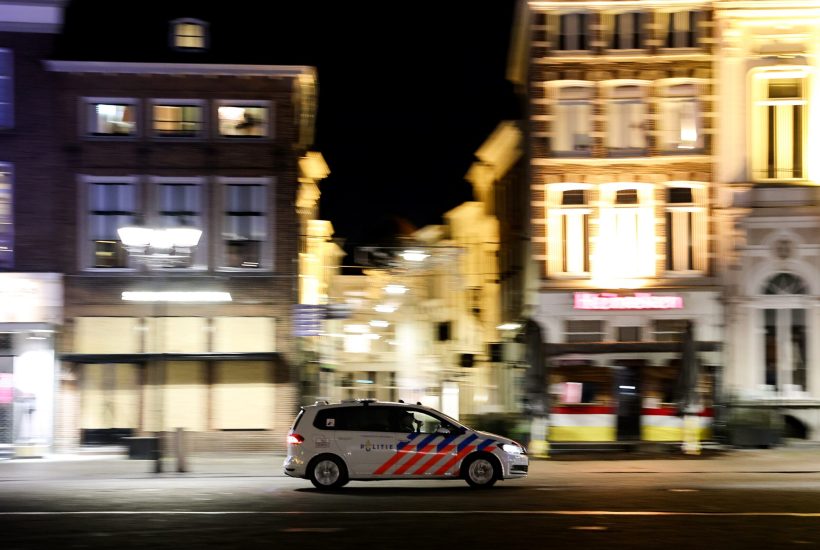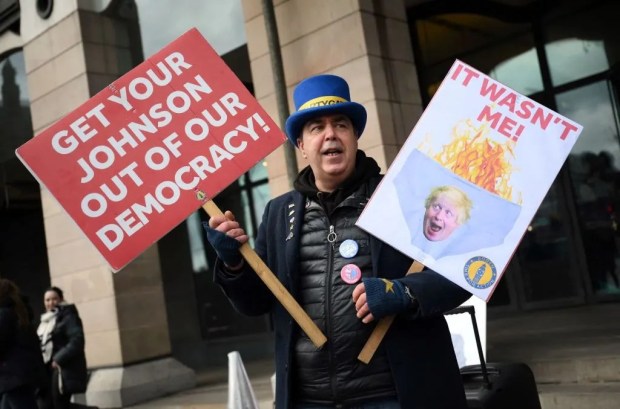Police were ready and supermarkets closed their doors, but on Tuesday evening it was unclear if a controversial curfew in the Netherlands would be respected. Earlier in the day, a court ruled that the legal basis for the curfew was invalid: it rests on a particular type of emergency ruling when instead it should have gone to a vote in the lower house.
This was, ruled the court in the Hague, ‘absolutely not’ the kind of situation for which the emergency law was intended, such as the breach of a dyke. Meanwhile, the court said the 9 p.m. to 4.30 a.m. curfew, which sparked nationwide hooliganism and riots after it was introduced in late January, constituted an ‘extreme breach’ of freedoms enshrined in Dutch law.
Willem Engel, chairman of a virus sceptic group now called Viruswaarheid (virus truth) which brought the case, told the broadcaster NOS that he expected people to be ‘out merrymaking’ in the streets. But as the government started emergency court action to see whether the curfew could remain in force until an appeal could be mounted — or possibly a new law passed — the broader repercussions were unclear. Then, just minutes before 9 p.m., the government successfully won an order to keep the curfew in force until its appeal is heard on Friday — while it is now also trying to push a new type of curfew law through both houses of parliament. Still, the broader repercussions of the legal win are crystallising.
Critics of the government said that it was a sign that the ‘caretaker’ government, made up of the ministers who formally stepped down in January over a long-running childcare benefits scandal, were incompetent and riding roughshod over constitutional freedoms. But other experts on voting behaviour and economic analysts were unsure this would change the results of upcoming March elections, for which the most likely outcome is a victory for caretaker Prime Minister Mark Rutte’s liberal People’s Party for Freedom and Democracy (VVD).
Mordechai Krispijn, an activist for protest groups including Viruswaarheid and Heart for Freedom (Hart voor Vrijheid), said he hoped that the court ruling would alert voters to the freedoms slipping through their fingers. ‘It is appalling that the caretaker government has continued to rule and imposed a curfew,’ he told me. ‘Good, trusting people have been completely cheated by this government in the belief that the rules are correct, while 14,000 fines of €95 [£83] have been handed out when there is no legal basis for them. The collateral damage is so much larger than the damage they are trying to limit.’
But legal experts were unsurprised by the court ruling, this situation was already predicted in advice from the Council of State, which gives legal opinion on all potential Dutch laws as part of the parliamentary procedure. In February the body made clear that the government had used the wrong kind of law to bring in restrictions.
Matthew Rodgers, Netherlands analyst at The Economist Intelligence Unit, said that although far-right parties such as Geert Wilders’ PVV Party for Freedom will try to make political capital from the ruling, it is unlikely to shift very many voters.
‘The fallout on public opinion and political stability looks quite limited,’ he said. ‘Even though there’s quite a strident group in the Netherlands, perhaps larger than in other countries, that opposes the curfew and further lockdown restrictions, the lion’s share of the public still backs the government on fundamental lockdown restrictions in principle.
‘The vociferous hostility to the curfew that we’ve seen is also interlaced in the public imagination with scenes of violence that were universally repudiated across the political spectrum, including those on the right. While the far-right might be feeling vindicated by the [court] decision, political damage has been done by the images of looting after the curfew began.’
Rutte, meanwhile, called on Dutch citizens to respect the spirit of the curfew, as the latest coronavirus figures showed a slight rise in infections week-on-week. ‘The judge’s verdict this morning is, of course, a setback,’ he said in a press conference. ‘If the legal basis for the curfew is wrong right now… that does not mean it is not necessary. The curfew is a means to an end, not an end in itself. The goal is to keep the coronavirus under control as much as possible, so that soon we all get our freedoms back, in a safe way. That is why we implemented the curfew and that hasn’t changed.’
Tom van der Meer, professor of political science and co-director of the Dutch parliamentary election survey at the University of Amsterdam, said that time will tell whether the court case will affect Rutte’s position in the polls or faith in government. ‘The rally round the flag sentiment has evidently benefited Mark Rutte since March 2020, almost one year ago,’ he told me. ‘His party grew sharply in the polls; trust in his government rose to unprecedented heights.’
In this case, the verdict probably will not affect the image that the supporters of government already hold, of politicians who do their best in a time of crisis. The verdict is primarily about constitutionality, not about the policy itself, and the verdict is not yet final. Third, VVD-voters do not have very evident alternatives, even if they are somewhat dissatisfied.’
Meanwhile, as the Dutch government scrambles to try to overturn the surprise ruling, mainstream virologists are still fully behind the curfew. Aura Timen, head of the National Coordination Centre for Communicable Disease Control, told NOS that without it and a one-visitor-a-day rule, the Netherlands would be skating on thin ice. ‘From the perspective of combatting a virus and public health, the curfew together with rules about visitors are extremely important to suppress the R-value, especially in the light of the arrival and growth of the British variant in the Netherlands,’ she said. ‘Without them, the figures would be far worse.’
Got something to add? Join the discussion and comment below.
Get 10 issues for just $10
Subscribe to The Spectator Australia today for the next 10 magazine issues, plus full online access, for just $10.




















Comments
Don't miss out
Join the conversation with other Spectator Australia readers. Subscribe to leave a comment.
SUBSCRIBEAlready a subscriber? Log in